
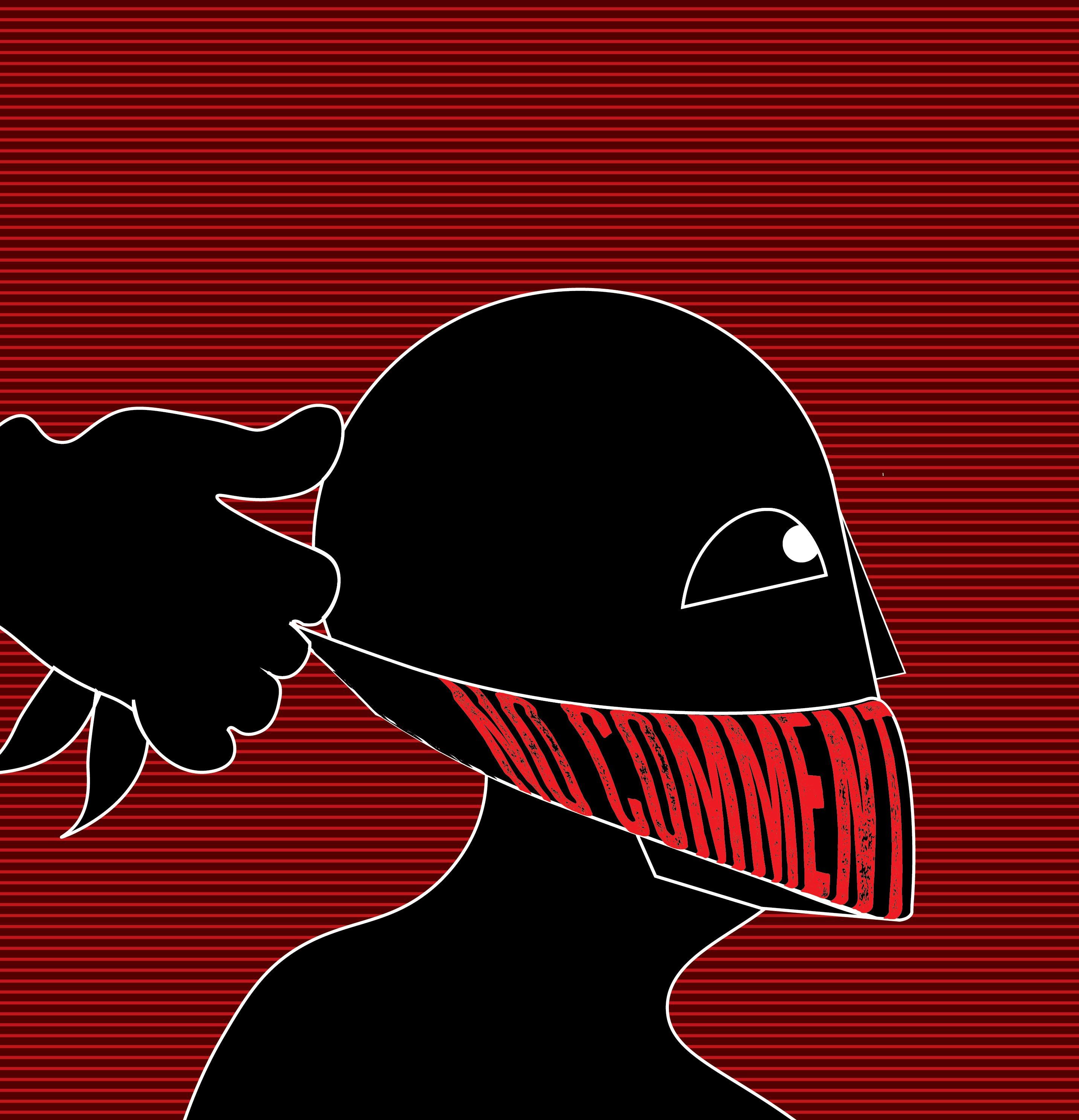








EDITOR-IN-CHIEF: Caden Dyer
MANAGING EDITOR: Ansley Graves
COPY CHIEF: Harper Brabson
NEWS EDITOR: Patrick Busch
ARTS & CULTURE EDITOR: Emma Caskill
SPORTS EDITOR: Trevor McGee
ASSISTANT SPORTS EDITOR: Alex Sarkis
OPINIONS EDITOR: Natalie Dripchak
PHOTO EDITOR: Jackson Clavier
DESIGN EDITOR: Lindsay Favre
ENGAGEMENT EDITOR: Sarah Portanka
AUDIENCE DEVELOPMENT EDITOR: Sophie Mehta
COVER DESIGN: Lindsay Favre
PAGE DESIGNERS: Ashley Cammarota, Renee Allen, Erin Higney, SaraJane Weber, Ava Balducci, Ava Edwards, Kate Wims, Maya Williams
ADVERTISING MANAGER: Abigail Cheslock
ADVERTISING REPRESENTATIVE: Joe Slott
TO REPORT A NEWS ITEM OR SUBMIT A PRESS RELEASE, please email editorinchief@utdailybeacon.com or call (865) 974-2348
TO PLACE AN AD, please email admanager@utk.edu.
LETTERS POLICY: Letters to the Editor must be exclusive to The Daily Beacon and cannot have been submitted to or published by other media. Letters should not exceed 400 words and can be edited or shortened for space. Letters can also be edited for grammar and typographical errors, and Letters that contain excessive grammatical errors can be rejected for this reason. Anonymous Letters will not be published. Authors should include their full name, mailing address, city of residence, phone number and e-mail address for verification purposes. Letters submitted without this information will not be published. The preferred method to submit a Letter to the Editor is to email the Editor-in-Chief.
CORRECTIONS POLICY: It is the Daily Beacon’s policy to quickly correct any factual errors and clarify any potentially misleading information. Errors brought to our attention by readers or staff members will be corrected and printed on page two of our publication. To report an error please send as much information as possible about where and when the error occurred to managingeditor@utdailybeacon. com, or call our newsroom at (865) 974-5206.
The Daily Beacon is published by students at The University of Tennessee on Wednesday during the fall and spring semesters. The offices are located at 1345 Circle Park Drive, 11 Communications Building, Knoxville, TN 37996-0314. The newspaper is free on campus and is available via mail subscription for $200/year or $100/semester. It is also available online at: www.utdailybeacon.com


CADEN DYER Editor-in-Chief
As I first considered journalism as a career option, it’s safe to say that I was blissfully unaware of the challenges facing my now-beloved industry.
As Gen Z turns more and more to social media as their primary news source, as distrust of reporters steadily mounts and as a quickly evolving media landscape forces journalists to adapt to every curveball, I can tell you one thing — journalism is not an easy profession to be in.
It is, however, a fulfilling one. In all 20 years of my life, I’ve never felt quite so passionate about something, or put so much of myself into a singular effort.
Being a journalist is vowing to be a public servant. I, and the entirety of the team at The Daily Beacon, believe that our job rests in informing our community so they in turn might make decisions that will positively shape our world.
Journalism has changed me as a person. It has broken down my echo chamber and brought me face to face with the stark reality of so many lives. My mind has been changed a million times over, and I would say that compassion, a virtue I previously knew by
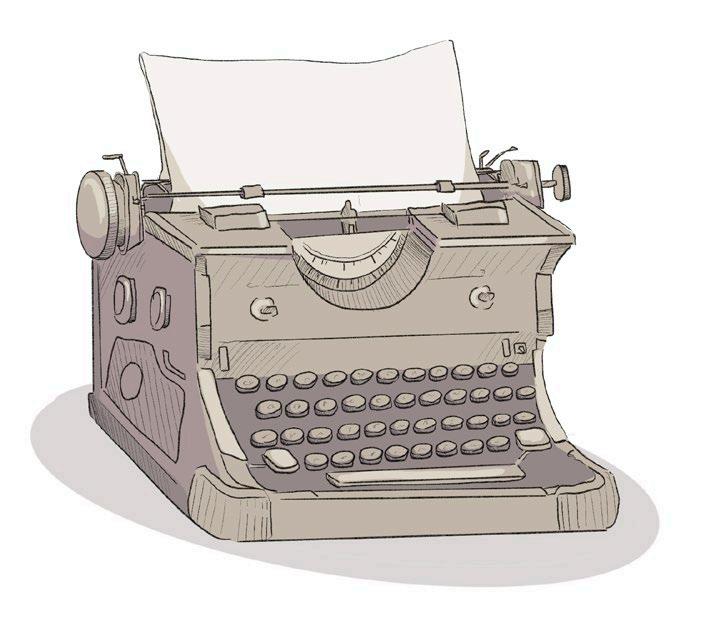
name only, has blossomed within my heart and grown.
That is what I hope our work does. That is what I think the Beacon is truly capable of. By bringing you honest information every day, we have extended our torch as far as possible. It is my hope that you, the reader, will grasp onto that torch firmly and then decide what to do with it. Will you pass it to the next person? Will you charge forward in enlightened action? Will you use that torch to light another’s? Or will you shine it to illuminate a path to further knowledge and seek deeper truth?
Lastly, journalism is incredibly critical to a healthy democracy, and it should be protected with fervor. Freedom of the press is a luxury many countries can only dream of, and here in America, that freedom is slowly falling under attack from every side. Truth can sting, and when it does,
the reporter is often blamed for telling it.
This month, I have watched in horror as Indiana Daily Student, a renowned college newspaper, has been ordered to stop print publication by their own university. This attempt to censor a student media outlet is dangerous, and frequently over the past few weeks, I have put myself in the shoes of the IDS student journalists.
I cannot imagine the stress they are under or the betrayal they must feel. IDS,
The Daily Beacon stands with you and condemns the actions of Indiana University Bloomington. Student media must be allowed (and encouraged) to flourish, or else the future of journalism will suffer. Who will be there in minutes to cover student protests? Who will understand the issues students want information on? Who will learn the ropes of reporting and be allowed to try, succeed, fail and grow before entering the professional world?
I sure as hell will.
Editors’ Note: This issue of The Daily Beacon is centered around the topic of freedom. We believe freedom should not be taken for granted, and so we have emboldened versions of the word “free” in red every time they appear in this print, as a reminder of the many freedoms we enjoy in America.
CADEN DYER Editor-in-Chief
Jan. 6, 2021
During the storming of the Capitol, at least 18 journalists reported being assaulted. Some of the reports say rioters and law enforcement officials targeted journalists.
March 23, 2021
The Department of Homeland Security and border patrol officials denied members of the press access to detention facilities that housed unaccompanied migrant children. Journalists said they could no longer go on ride-alongs with patrol agents, and that they had been “physically blocked” at the Rio Grande riverbank, a known point of access used during previous administrations.
Feb. 11, 2025
The White House blocked the Associated Press from the Oval Office when its journalists continued to
refer to “the Gulf of Mexico” rather than follow the administration’s stance that it is “the Gulf of America.”
The AP said the news agency decided against adopting “the Gulf of America” because of the centuries-long history behind that name and the fact that Mexico and other international organizations did not recognize the change.
May 1, 2025
The White House issued an executive order to cease federal funding for National Public Radio and the Public Broadcasting Service.
NPR and PBS receive funding via taxpayer dollars through the Corporation for Public Broadcasting, which outlines in its governing statute that it may not “contribute to or otherwise support any political party.” The executive order wrote that by funding NPR and PBS, CPB does not follow this principle.
The White House further stated that media outlets do not have a constitutional right to
taxpayer subsidies and that it is the government’s responsibility to determine which categories of activities to subsidize.
Oct. 15, 2025
Journalists walked out of the Pentagon rather than agree to new rules set by Secretary of Defense Pete Hesgeth.
These rules would have restricted where journalists could move within the Pentagon without an official escort, as well as kept them from reporting on information not approved for official release — even unclassified information.
“Limiting the media’s ability to report on the U.S. military fails to honor the American families who have entrusted their sons and daughters to serve in it, or the taxpayers responsible for giving the department hundreds of billions of dollars a year,” the Pentagon Press Association said in a statement. “The American people deserve to know how their military is being run.”
As outlined in a memorandum written by UT Faculty Senate Faculty Affairs Committee Co-Chairs David Butler and Eva Cowell, “The University is pursuing the termination of Tamar Shirinian under Faculty Handbook section 3.12.3 (Termination Procedures for Misconduct).” Read more about the memorandum and its writers on page 5.
The university may terminate a tenured or tenure-track faculty member “for misconduct within the definition of Adequate Cause” under Faculty Handbook policy 3.12.3. The process for termination for misconduct includes 3.12.3.3, 3.12.3.4 and a final decision by the chief academic officer (3.12.3.5), or these policies can be bypassed via expedited termination (3.12.3.8).
The following are excerpts from UTK’s Faculty Handbook, effective Sept. 8, 2025, section 3.12: Procedures for Terminating Tenured Faculty. Read the full handbook at facultyhandbook.utk.edu.
3.12.3.2 Consultation with the tenured faculty
The department head shall consult with the departmental tenured faculty before making a recommendation regarding whether a faculty member’s alleged misconduct constitutes Adequate Cause for termination.
3.12.3.4 Dean’s recommendation
If the dean concludes that a faculty member’s alleged misconduct constitutes Adequate Cause for termination, he or she shall forward a written recommendation and the reasoning supporting the recommendation to the chief academic officer.
3.12.3.8 Expedited Procedure for Termination or Suspension without Pay in Certain Cases of Misconduct
In the following cases of alleged misconduct by a faculty member, the chief academic officer, after consulting with the chancellor, the president, and the President of the faculty senate or the Faculty Senate Executive Committee (or campus equivalent), may invoke an expedited procedure to accomplish termination or suspension without pay, with comprehensive due process procedures to be offered after termination or suspension without pay:
A. alleged misconduct involving:
1. acts or credible threats of harm to a person or university property; or 2.theft or misappropriation of university funds, property, services, or other resources
The following are excerpts from the UT System Policies, under the Board of Trustees and Human Resources categories. Read the full policies at policy.tennessee.edu.
BT0006 Article I: Academic Freedom and Responsibility of the Faculty Member
When, as a citizen, a faculty member speaks outside the classroom or writes for publication, he or she should be free, as a citizen, to express his or her opinions. Each faculty member should conduct himself or herself professionally, should be accurate, should exercise appropriate restraint, should show respect for the opinions of others, and should make clear that he or she speaks for himself or herself and not for the University.
BT0006 Article II: Academic Freedom and Responsibility of the University Administration
The administration is responsible for enforcing all Board and campus policies applicable to faculty members. It is the duty of the administration — beginning with department heads, deans, and chief academic officers — to remove from the faculty any faculty member who has been found, through proper procedures, seriously derelict in his or her responsibilities as a member of the academic community.
Board of Trustees policy HR0580 states that “discriminatory, abusive, insulting, or offensive language, including threats, derogatory remarks, epithets, sexually explicit jokes, or jokes that demonstrate insensitivity to a particular group” may violate the Code of Conduct. This includes “abusive or irresponsible behavior on social media that violates any provision of this Code of Conduct.”
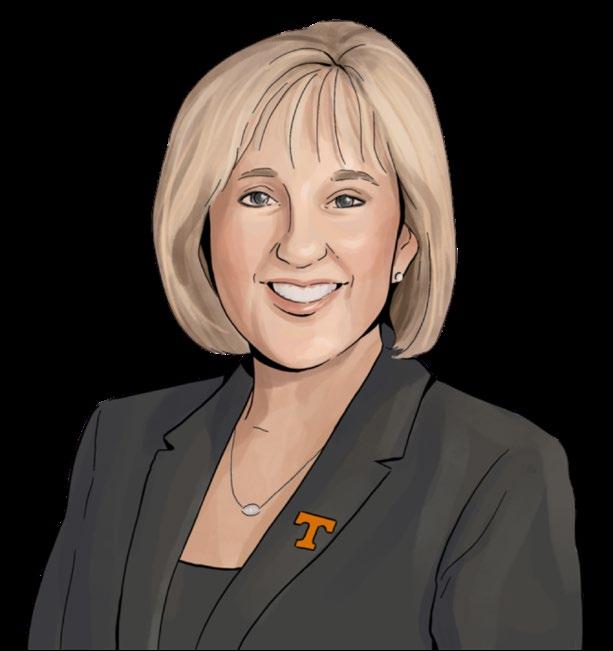
by Ava Edwards
‘Undermined the mission’
CADEN DYER Editor-in-Chief OLIVIA LEE Staff Writer
According to UT Faculty Senate Faculty Affairs Committee Co-Chairs John Butler and Eva Cowell, sections 3.12.3.2 and 3.12.3.4 have been bypassed by UT administration in the proceedings against anthropology professor Tamar Shirinian, and the university is now invoking the Expedited Procedure as written in 3.12.3.8.
Chief Academic Officer and UT Provost John Zomchick did not invoke this procedure. Instead, Chancellor Donde Plowman did.
In an academic freedom discussion on Oct. 16, Zomchick responded to faculty questions and expounded on the chancellor’s actions.
“You’re absolutely right that the policy for expedited termination — the policy for any termination — says that the chief academic officer has a role to play,” Zomchick said. “In this case, the chancellor took on that role.”
Zomchick said he could not cite a policy allowing Plowman to do so.
Chancellor Donde Plowman provided faculty with three reasons why termination proceedings were initiated in a Faculty Senate meeting Sept. 22. Certain cases of alleged misconduct are outlined in 3.12.3.8.
“In my view, the faculty
member, one, violated the university’s expectations for civil and professional engagement, and respectful conduct.
“The faculty member undermined the mission and the focus of the university through her misconduct.
“And number three, harmed the reputation of the university. Our reputation is something we have built over the years, and I’m the steward — as are all of you, I would say — of that reputation. Our brand, our reputation as a land-grant university is something that we take seriously, and I thought that action actually harmed the reputation of the university considerably.”
Communication with Shirinian
In her letter to Shirinian outlining the grounds for termination, Plowman cited BT0006, Article 1. Plowman also included part of BT0006, Article 2, writing, “The administration is responsible for enforcing all Board and campus policies applicable to faculty members. It is the duty of the administration … to remove from the faculty any faculty member who has been found, through proper procedures, seriously derelict in his or her responsibilities as a member of the academic community.”
The ellipsis replaces a line in the handbook listing which administrative officers can initiate the process.
Sept. 10 – Sept. 14
Tamar Shirinian comments on Facebook from her private account on a friend’s private account post: “The world is better off without him in it. Even those who are claiming to be sad for his wife and kids...like, his kids are better off living in a world without a disgusting psychopath like him and his wife, well, she’s a sick fuck for marrying him so I dont care about her feelings.”
Charlie Kirk is assassinated at Utah Valley University, prompting political violence and online discourse about his opinions.
Shirinian’s post is spread online, receiving attention from conservative influencers, such as Robby Starbuck, and state politicians, such as Marsha Blackburn and Tim Burchett, who call UT to take action against Shirinian.
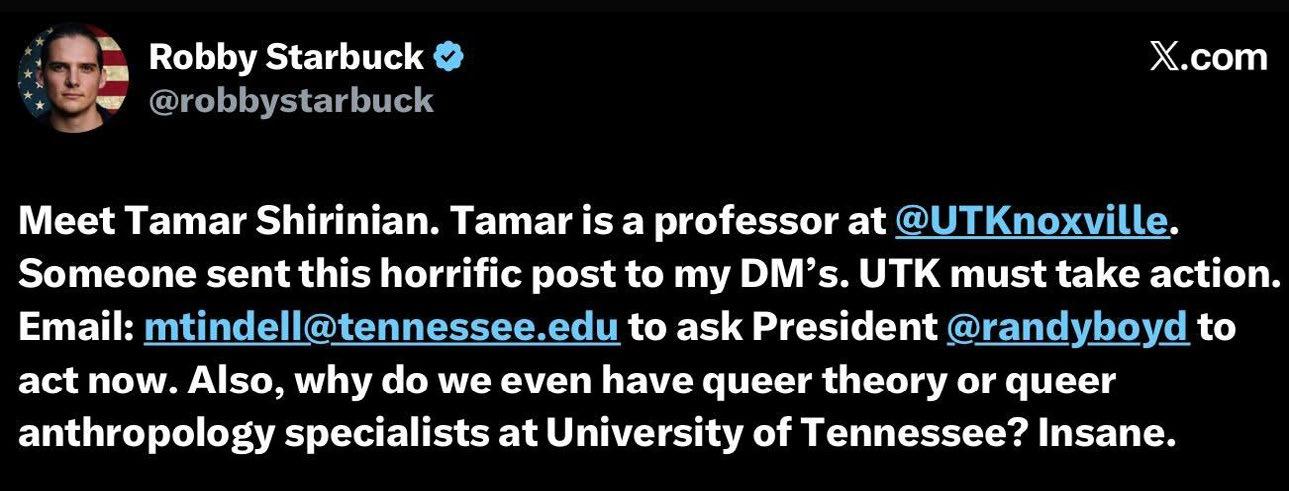
SEPT.10
WEDNESDAY
SUNDAY
SEPT.14
SEPT.15
MONDAY
In the morning, UT President Randy Boyd announces on Twitter that the university is actively investigating the situation.
In the afternoon, UT Knoxville posts a campus update to Instagram and Twitter:
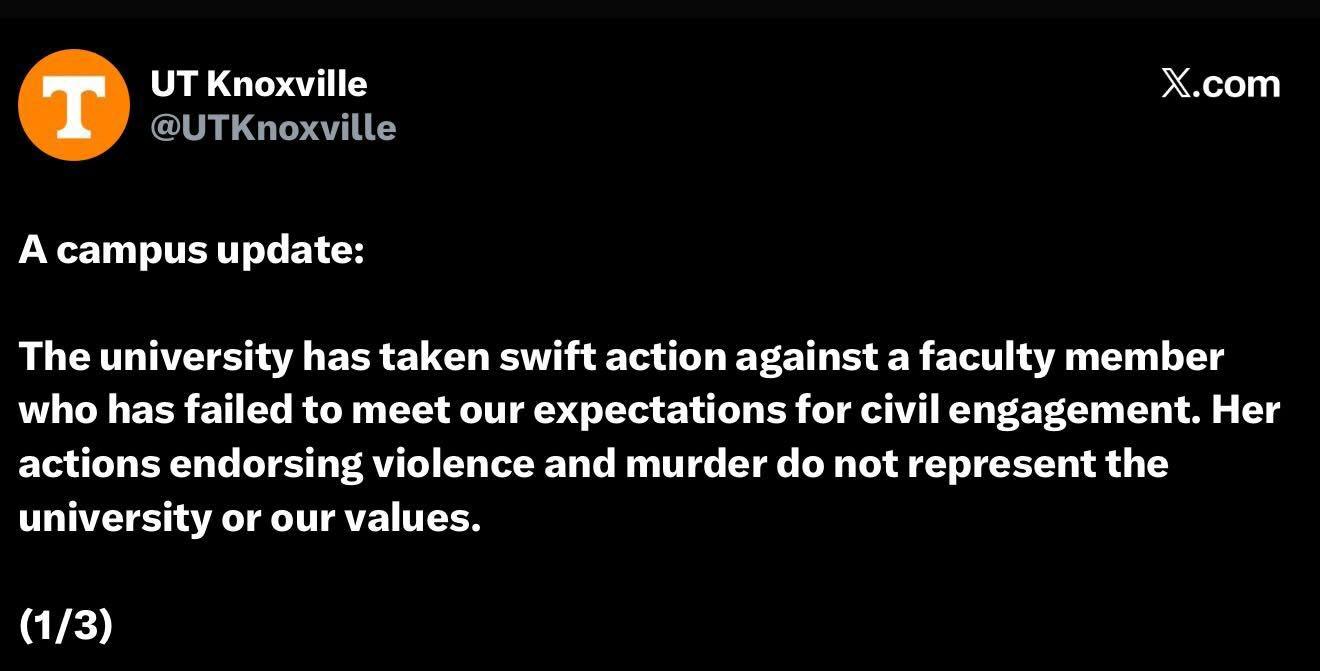
Chancellor Donde Plowman issues a statement via email, saying: “Violence on a university campus wounds the heart of our academic mission, and no statements endorsing a campus shooting can be acceptable to an institution.”
Governor Bill Lee thanks Plowman and Boyd for their actions via Facebook.
Plowman sends Shirinian a letter about her administrative leave.
Plowman sends another letter detailing her grounds for termination. Excerpts below:
Given the public nature of your egregious misconduct and, after consulting with the Provost and President Boyd, I will continue to handle this matter directly as the chief executive officer of this campus. ...
Several policies clearly describe the freedom a faculty member has to seek knowledge and share that knowledge in the context of their academic discipline. But that freedom comes with the obligation to engage in a civil manner. ...
BT0006Article I. Paragraph 7.) The Board of Trustees has entrusted campus administration with implementing this policy: “it is the duty of the administration . . . to remove from the faculty any faculty member who has been found, through proper procedures, seriously derelict in his or her responsibilities as a member of the academic community.” (Article II. Paragraph 3.) Adequate cause for termination exists when a faculty member engages in “any misconduct directly related to the fitness of the faculty member to engage in teaching, research, service, or administration.” (Article III. Section J.1.).”
TUESDAY SEPT.16
MONDAY SEPT.22
Shirinian sends a letter of appeal to the chancellor.
“I understand, however, that no matter how bigoted and hateful his comments were, and how much his events targeted my colleagues’ and my livelihood, how much they incited students to take action against their professors and defund universities such as the one over which you preside as Chancellor, that Mr. Kirk had the right to free speech to express such ideas. And that is one of the things that I value most about our country. I ask ... that you change your mind and allow me to continue to return to things that I love: scholarship and teaching students. If not, I will appeal any and all decisions within the University and, if necessary, go to court to protect my First Amendment rights.”
Zomchick meets with faculty at a private, regularly scheduled coffee and conversation event. Faculty dicuss concerns over academic freedom at the meeting.
The UT Board of Trustees meets Oct. 23-24. UT professor Paul Gellert addresses the board regarding protections for faculty free speech and expression. Read more about the address on page 7.
The Faculty Senate meets and does not directly address Shirinian case, but they do share that they’re drafting social media guidelines for faculty.
Plowman addresses concerns at the faculty senate, saying what she did was in the interest of the university.
THURSDAY SEPT.25
MONDAY OCT.20
WEDNESDAY OCT.15
WEDNESDAY OCT.22
American Association of University Professors hosts an academic freedom panel to educate students and faculty and answer questions.
Campus Free Speech Protection Act Universal citation: TN Code § 49-7-2405 (2024)
(a) The governing body of every institution shall adopt a policy that affirms the following principles of free speech, which are the public policy of this state:
(3) An institution shall be committed to maintaining a campus as a marketplace of ideas for all students and all faculty in which the free exchange of ideas is not to be suppressed because the ideas put forth are thought by some or even by most members of the institution’s community to be offensive, unwise, immoral, indecent, disagreeable, conservative, liberal, traditional, radical, or wrongheaded.
Zomchick hosts a faculty discussion regarding Shirinian’s case and academic freedom.
CADEN DYER Editor-in-Chief
On Oct. 3, UT Faculty Affairs Committee Co-Chairs David Butler and Eva Cowell sent a memorandum to the UT Faculty Senate under the subject “Review of Institutional Policies and Procedures Highlighted by Recent Personnel Actions Prepared for Executive Council Meeting.”
The writers requested that the memo be added to the Faculty Senate Executive Council agenda for Oct. 13, and additionally requested that Provost John Zomchick be prepared to answer its questions during the council meeting. The meeting’s public agenda includes the memo.
“We have not received a response from Provost Zomchick addressing the concerns in our memo,” Butler said.
“While he was traveling and unable to attend the recent Faculty Senate Executive Council meeting where we had hoped for a discussion, our questions remain formally unanswered.”
The Faculty Affairs Committee serves to recommend adoption and amendment of faculty governance policies and rules.
“A core function of our committee is to understand the administration’s interpretation and implementation of those criteria and procedures as currently adopted, particularly those in Faculty Handbook 3.12.3,” Butler said. Minutes from the council meeting have not been publicly provided.
“We have been addressing our concerns in close collaboration with senate leadership and are discussing possible next steps,” Cowell said.
Some of the memo’s specific questions are outlined to the right, and here’s a brief summary of the memo’s points.
1. Addressing the termination proceedings that have begun against UT anthropology professor Tamar Shirinian, it states that the university has bypassed the standard procedures, and
asks, “on what specific grounds is the university now proceeding with termination?”
2. UT policy categorizes faculty speech three ways: within their professional expertise, outside their professional expertise, and outside the workplace and their role as faculty member. The memo points out that the Faculty Handbook and Board of Trustees’ Policy state faculty members may communicate as citizens, operating independently of the university, and asks what criteria the university uses to judge between faculty speech made as a private citizen or as a university employee.
3. The memo asks the university to reconcile its actions against Shirinian with the Tennessee Campus Free Speech Protection Act (printed on page 5).
4. Shirinian wrote in a letter of appeal to the chancellor that she received “a significant amount of hate mail.” The committee notes its concern that the university could be perceived as failing its duty to care for Shirinian as a faculty member amid the alleged harassment.
5. The memo sharply addresses a “critical lack” of protocol for reviewing faculty members’ personal speech.
6. It closes by asking the council to list measures the university has put into place to guard against external political influence on personnel processes.
“Regarding faculty speech, the rights of public university faculty as private citizens are clearly defined for UTK faculty in Faculty Handbook 2.1.3, and firmly established by the First Amendment of the U.S. Constitution and supporting case law,” Butler said. “Similarly, the right of due process for public employees is established by the Fourteenth Amendment of the U.S. Constitution, which essentially requires public institutions to follow their own adopted policies regarding employment.
“We will continue to seek answers to the questions posed in our memo to fulfill the committee’s defined governance role.”
Faculty Handbook, 2.1.3: Freedom as a Citizen
When faculty members communicate as citizens on matters of public concern, they operate independently of the university. In this situation, faculty members have rights common to all citizens, including the rights to organize associations, join associations, participate in public meetings, run for, and serve in government offices subject to applicable state and federal laws and university Human Resources policies, demonstrate, picket, and voice their opinions. When exercising their rights as citizens, faculty members must also respect the university by not claiming to represent the positions or views of the university and by not using institutional resources.
Here are some of the questions outlined in David Butler and Eva Cowell’s memorandum. You can read the full memorandum at utdailybeacon.com.
Given that the publicly stated reasons for termination do not meet the narrow criteria for invoking the expedited procedure under 3.12.3.8, on what specific grounds is the University now proceeding with termination?
Irrespective of the case of Dr. Shirinian, is it the University’s position that failure to follow the guidelines of Faculty Handbook 3.12.3, while moving forward with termination proceedings of a faculty member under 3.12.3, would not represent a due process violation?
How does the administration reconcile its actions in this case with the specific protections for faculty private citizen speech outlined in Faculty Handbook 2.1.3 and how does the administration plan to uphold Faculty Handbook 2.1.3 and protect faculty free speech rights as private citizens going forward?
The University’s actions in this case appear to treat speech that is affirmed as a right under Faculty Handbook 2.1.3 as potential “misconduct.” Please explain how the University can maintain that private citizen speech is a protected right while simultaneously holding that the same speech can constitute misconduct, without rendering the protections of 2.1.3 meaningless.
Given this potential conflict, what specific, objective criteria does the University use to distinguish between speech made by a faculty member as a private citizen and speech undertaken in their capacity as a University employee?
How does the administration reconcile the initiation of termination proceedings against Dr. Shirinian with the specific, unequivocal protections for faculty speech codified in state law?
Please clarify if the administration’s position is that speech protected by the Tennessee Campus Free Speech Protection Act can simultaneously be deemed “misconduct” under University policy. If so, please explain how this position is legally tenable.
What specific actions did the University take to assess the source of violent, bigoted, and threatening harassment against Dr. Shirinian? This includes determining if any perpetrators were affiliated with the University and evaluating whether the threats constituted an imminent risk to Dr. Shirinian, her students, or colleagues.
What are the University’s explicit, written protocols regarding the review of a faculty member’s personal speech or personal social media activity? Furthermore, do these protocols include any temporal guidelines or a functional statute of limitations governing when historical speech becomes subject to review, and how the relevance or timeliness of a complaint is assessed?
How does the administration respond to the perception that review is inconsistent or initiated primarily in response to politically motivated external complaints? What specific, measurable steps will the administration take to ensure that the initiation of speech reviews is based on neutral, content-agnostic criteria rather than the volume or source of complaints?
What specific, verifiable measures are in place to safeguard the integrity and independence of all personnel processes from external political influence, and to ensure decisions are based solely on University policy and applicable law? Specifically, does the University have a protocol for logging, disclosing, and formally insulating a case from external communications (e.g., from politicians, donors, or organized groups) that attempt to influence a personnel process?
PATRICK BUSCH, News Editor
OLIVIA LEE, Staff Writer
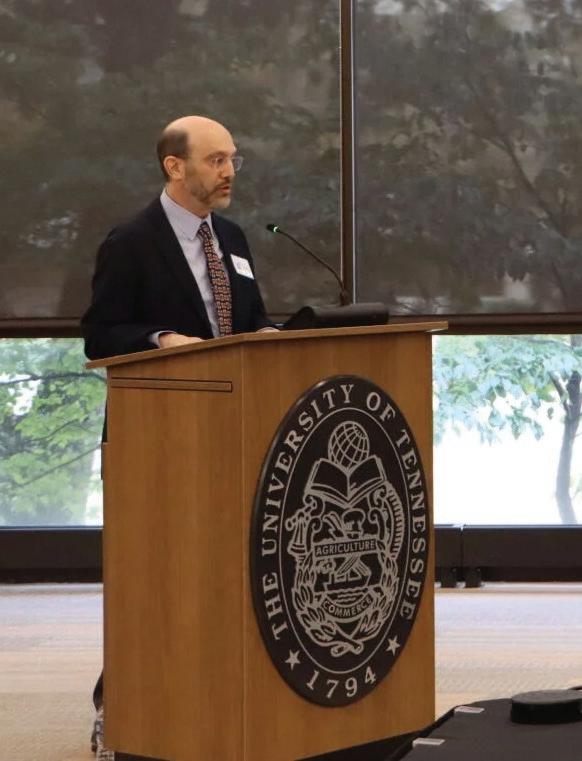
Last week’s Board of Trustees session culminated in a final meeting Friday morning, directed by UT System President Randy Boyd.
“This will be the greatest decade in the University of Tennessee,” Boyd said. “It’s a commitment, and we’re well on our way.”
After a brief moment of prayer, Paul Gellert, UTK professor of sociology and treasurer of UT’s chapter of the American Association of University Professors, kicked off the meeting by addressing the board on behalf of the AAUP asking for a united front to protect academic freedom.
“The provost stated at a recent forum that the line between acceptable and unacceptable speech is moving, but to where, he could not specify,” Gellert said. “Such statements add to the uncertainty, and the uncertainty is causing fear. … Many are unwilling to speak publicly about higher education at UT, and yet they persevere everyday in all corners of the university.”
Gellert diagnosed the climate of uncertainty and fear on campus as “not healthy.”
“Although the university greatly values civility and mutual respect, concerns about civility and mutual respect must not be used by the university as a justification for closing off the discussion of ideas — however offensive, unwise, immoral, indecent, disagreeable, conservative, liberal, traditional, radical or wrong-headed those ideas may be to some students or faculty,” Gellert said, citing UT Board of Trustees policy.
Gellert asked the board to reaffirm their commitment to freedom of expression at UT, and he warned against UT joining the Trump Compact.
“This compact is a misguided attempt at thought policing and threatens America’s world leadership and new leadership in science, technology, innovation and healthcare,” Gellert said. “We stand for education, for science, for our students and for freedom.”
UT System President Randy Boyd responded to Gellert’s address.
“We are committed to following all university policies, all state and federal
laws and to the protection guaranteed by the first amendment,” Boyd said. “Our campuses remain places where ideas can be shared and debated.”
The board continued to discuss a series of topics, including the university’s devotion to driving research and innovation, as well as online efficiency projects. You can read more about the meeting at utdailybeacon.com.
Conclusion and the path forward
Wrapping up the meeting, trustee Bill Rhodes asked board members to look forward to how board decisions will pay off in the future.
“During our tenures in this role, as trustees, there will be three, four, five big decisions that we get right,” Rhodes said. “I wonder what those three, four, five in here are that are going to be the ones we look back a decade from now and say, ‘Wow, we did that, and we made a difference for our state.’”
The Board of Trustees will hold their winter meeting at the UT Health Science Center, Feb. 26-27, 2026.
OLIVIA LEE Staff Writer
On the corner of Cumberland and Melrose, behind a small courtyard, stands the three-story rotunda of the Howard H. Baker Jr. Center for Public Policy. The 17-year-old building houses UT’s 22-year-old Baker School of Public Policy and Public Affairs. The school’s namesake, former U.S. Sen. Howard Baker, was nicknamed the “Great Conciliator” for his ability to compromise across the aisle.
“There are a lot of institutions that get named for some politician, and it’s just a name,” John Scheb, interim associate dean of academic affairs at the school, said. “But here, it’s different.”
Since its establishment by the UT Board of Trustees in 2003, the school has focused on continuing Baker’s mission of bipartisan public service by encouraging students to collaborate across the party line.
“Social media has really allowed people to, kind of, retreat into their echo chambers and never really
engage with people who think differently,” Scheb said. “And we’re trying to get people to be willing to do that.”
The school’s broader mission is to educate students about the history of the American government, preparing them to enter public service positions of their own, whether they’re serving local, state or national communities.
“We want them to be exposed to, especially, the philosophy associated with the founding of the country, and how our institutions have evolved and adapted to changing circumstances,” Scheb said.
Born from the political science department, UT established the Baker School out of the belief that public affairs goes beyond political science, stemming into multiple diverse disciplines.
“It really serves to train people for the public service,” Scheb said. “I always thought that there was a real need for this on campus, that it wasn’t a need that could be met by just one department.”
One of the highlights of the Baker School is its Institute of American Civics, which the Tennessee State Legislature established in 2022. UT
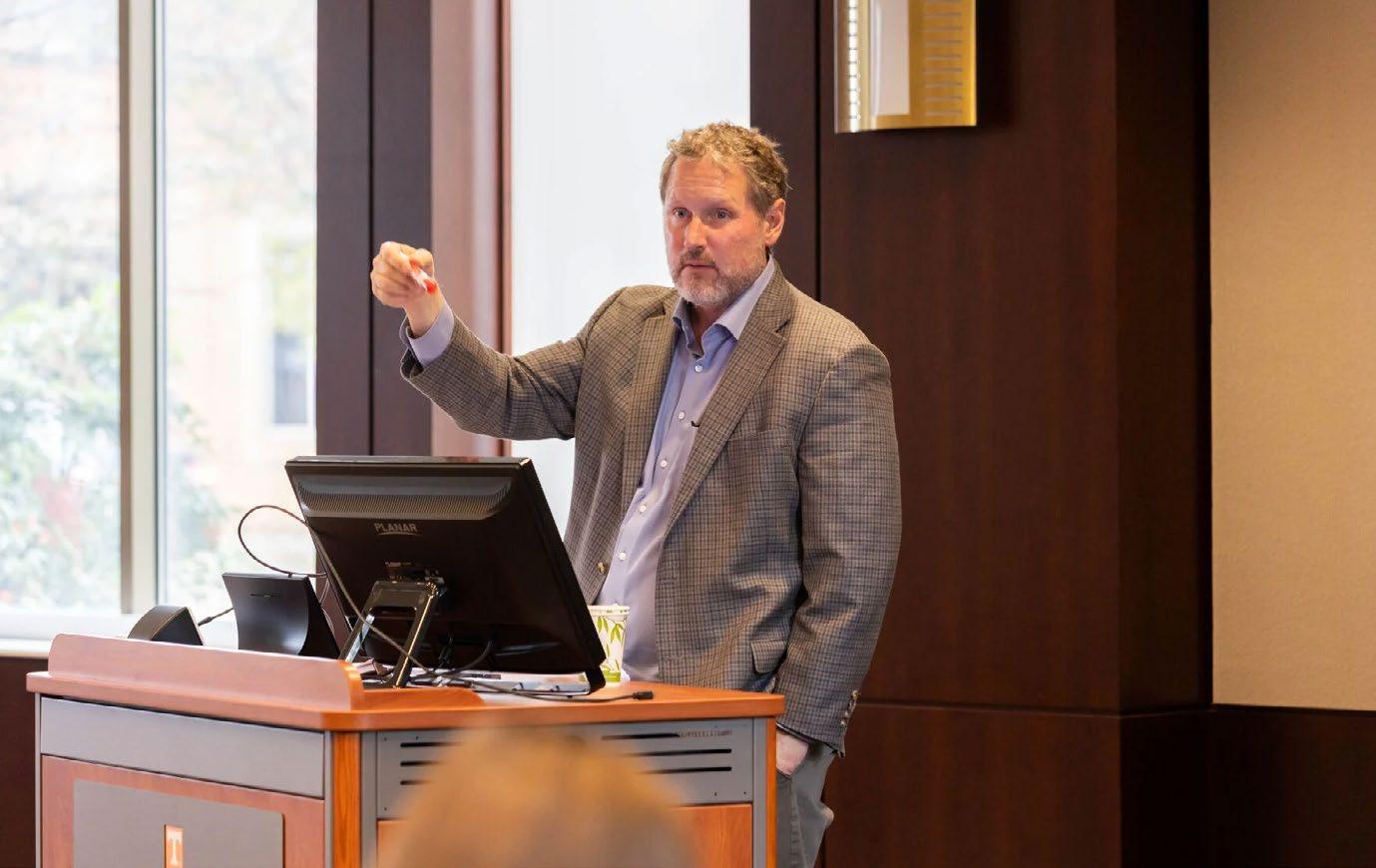
professors sent a memorandum to the legislature asking for the creation of the institute and explaining its importance.
“It got to the lack of civic knowledge,” Bill Lyons, professor emeritus and associate director for community outreach for the Institute of Ameri-
can Civics, said. “The people are not engaged as much, and of course the lack of civility and the ability to talk to each other.”
STORY CONTINUED ON PAGE 12
EMMA CASKILL Arts & Culture Editor
A skill acquired by experience, study or observation.
In Merriam-Webster’s words, this is the definition of art. Art comes in many different forms — visual, written and noise. Used to express emotion, many artists use their work to reflect on the political standing of our world.
Aminah Cabral, a junior at UT studying English, first noticed the political standing of the U.S. showing up in her poetry in high school.
“I forget the exact assignment, but I had to write something about what it means to live in America,” Cabral said. “The title of the poem is ‘One,’ and it explores unity in America, and how we, as a society, have strayed so far away from that.”
Half Mexican and half African American, Cabral explains that poetry is a gateway for her to be able to express her identity unapologetically. Jasmine Flowers, a graduate student at UT studying creative writing, says that her poetry also is a way for her to reflect on her identity.
“I’m from Alabama, so the South plays a vital role in how I express myself,” Flowers said.
Flowers explained that she hasn’t always used poetry to express her political viewpoints but it began showing up in the background of her work in 2020.
“We’re all connected, and we must do our part to stamp out oppression everywhere,” Flowers said. “I want my work to reflect that, but I’m still deciding how I want to achieve that goal responsibly.”
Flowers uses her poetry to discuss topics including race, sexuality and religion.
“I’m always considering how systems of power have influenced my thinking,” Flowers said. “Poetry is a great avenue to explore ideas that challenge these systems.”
Similar to Flowers, Cabral uses her poetry to speak for those who need someone to tell their story.
“Issues relating to immigrants, People of Color, women, mental health, sexuality and hate crimes, are topics I feel closest to,” Cabral said.
Leonard Adams, a senior at UT studying English, uses his poetry to reflect on his time spent serving the country in the National Guard and his changing emotions on patriotism, among other aspects. Adams never considered himself a poet until he found the art form to be a useful way to deflect.
“One night, I couldn’t sleep and decided to write a poem,” Adams said. “I ended up writing a haiku about my deployment to D.C. during BLM and another poem kind of venting my frustrations to God.”
Adams found that his views on the political climate changed his writing, allowing him to express himself in a simpler but more meaningful way. Cabral also explained that she feels the same way.
“Writing poetry has made me feel empowered,” Cabral said. “To be able to put your exact feelings and make something beautiful, or something meaningful, or something that encapsulates exactly what someone else is feeling but can’t say, is such a great way to connect to others.”
For Flowers, writing politically focused poetry allows her to recognize the ways in which all areas of her life work together.
“There doesn’t have to be so much separation,” Flowers said. “It’s about being a whole person whose beliefs reach every part of how I live and show up in the world.”
Through their work, Adams, Flowers and Cabral hope to bring awareness to the social issues that matter most to them.
“Poetry is just as capable of spreading influential ideas as a newspaper or political pamphlet,” Flowers said. “That’s why the suppression of the arts is a tactic used by oppressive governments.”
Since 2021, nearly 23,000 books have been banned in the national public school systems. A growing number, books that include race or racism, LGBTQ+ topics and sexual content are predominately targeted. Despite these numbers, Cabral feels that her work still makes a call for action.
“Even if you don’t feel like your poetry has made a difference, it has,” Cabral said. “Any productive way of expressing your opinions makes a difference.”
To read poetry by Cabral, Flowers and Adams, visit utdailybeacon.com and look up this story.
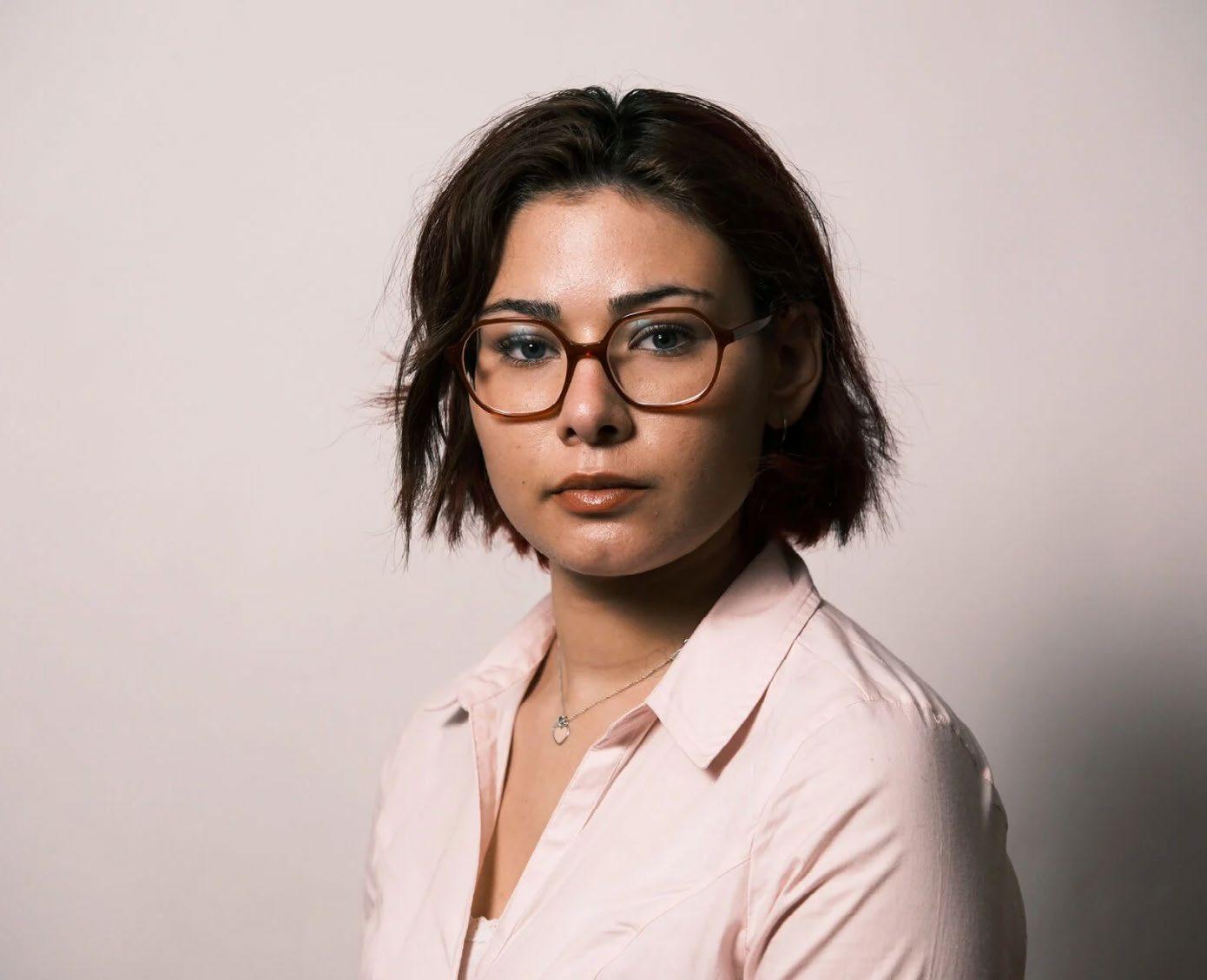
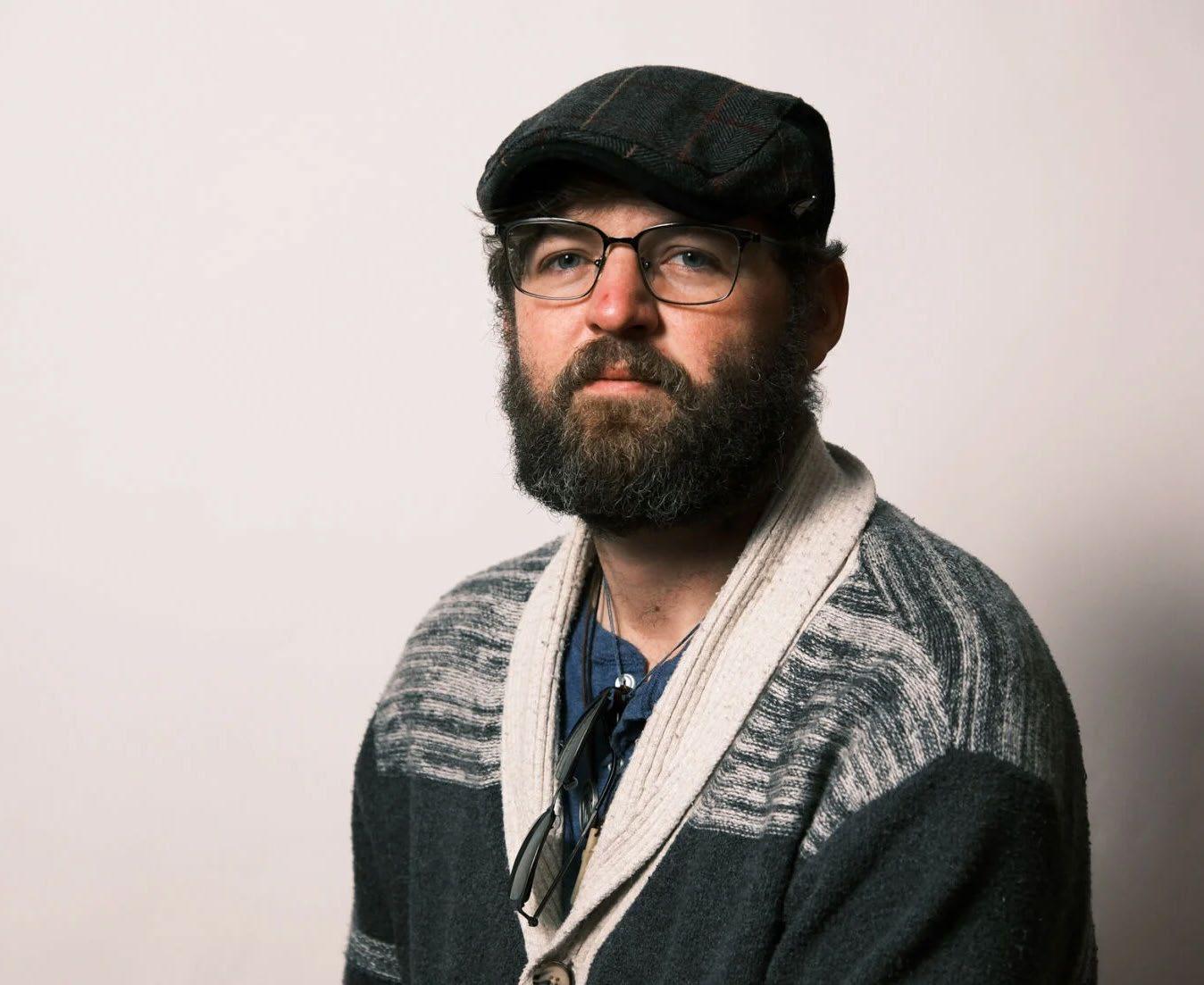
This editorial was written by Mia Hilkowitz and Andrew Miller, co editor-in-chiefs of Indiana Daily Student. It was published by IDS on Oct. 15, 2025. It has been republished by The Daily Beacon with permission.

ndiana University fully cut the Indiana Daily Student’s print newspaper — including the special publications it had earlier indicated it wanted us to run — Tuesday evening, hours after firing its student media director. Our next edition, part of volume 158, in our 158th year of publication, was set to go out Thursday.
IU and The Media School had previously directed the IDS to stop printing news coverage in our newspaper. Only the special editions, traditionally included as inserts in our paper. Telling us what we can and cannot print is unlawful censorship. The Student Press Law Center agrees and had told the university to reverse course.
After former Director of Student Media Jim Rodenbush resisted, IU fired him. When we asked them to rescind the order, it cut print entirely.
So the newsstands Thursday, and all other Thursdays from now on, will not have news, sports, arts or investigative stories. No letters. Not even the special publications they had originally wanted us to print.
We didn’t make this call. Media School Dean David Tolchinsky sent the order to us in an email responding to our appeal that the school not censor our newspaper. He didn’t respond when we asked for clarification.
When approached Wednesday, Tolchinsky had no substantial response to questions surrounding Rodenbush’s termination or cutting IDS print entirely. Galen Clavio, the Media School’s associate dean for undergraduate education, told the IDS his understanding was that an interim director of student media “has either been named or will be shortly” and a search is coming.
We reached back out to multiple administrators and IU spokesperson Mark Bode on Wednesday for further clarification.
“Indiana University Bloomington is firmly committed to the free expression and editorial independence of student media,” IU Bloomington Chancellor David Reingold said in a statement. “The university has not and will not interfere with their editorial judgment.”
“In support of the Media School and implementation of their Action Plan, the campus is completing the shift from print to digital effective this week,” he continued. “To be clear, the campus’ decision concerns the medium of
distribution, not editorial content. All editorial decisions have and will continue to rest solely with the leadership of IDS and all IU student media. We uphold the right of student journalists to pursue stories freely and without interference.”
As it stands, we have no way to trust this. To cut print entirely is a clear, blatant reaction to our protests. Or maybe the university cut print this week by pure coincidence?
What happens to our advertising contracts, which make us money?
Does the university care if our reputation among advertisers plummets? It seems the budget may not be the only consideration behind IU's decision.
What happens when the university decides it’s had enough of our digital presence? That our independent reporting doesn’t benefit “the campus?” Perhaps if our deficit continues online — after all the aforementioned issues — cutting back operations entirely could be framed as a budgetary decision.
The Media School is more focused on censorship than real solutions for student media. Is this really the best use of the university’s resources? Or of ours? Editorial decisions, including the contents of our print product, firmly lie in the hands of the students.
This is not about print. This is about a breach of editorial independence. If IU decides certain types of content are “bad for business,” what stops them from prohibiting stories that hold them to account on our other platforms?
We don’t want to say our voices are completely cut out. We’ve had extremely productive discussions with Michael Arnold, executive director of integrated public media. Already in his new role, he’s worked to understand our perspective. We hope this continues in the future.
But “the campus” is focusing its attention in the wrong directions: censorship, hostility and irrational business.
When administrators are unwilling to bring student media to the table, there’s no way for us to believe they are acting in good faith. When we directly brought up the potential the school would direct us to stop printing news in a meeting earlier this semester with Media School administrators, they danced around the issue.
We’re waiting to come to the table. We will continue to resist as long as the university disregards the law. Any other means than court would be preferred.




Margie E. Burke
Deprive of vital parts
20 Coastal disaster 22 White weasels
23 Painter Henri, but not Matisse
25 Cut with a light beam
26 100-eyed giant of myth
28 Ill will
30 Goes in again
32 Detection device
36 Quaint lodging
37 Makes certain of
39 Org. in 2025's
"The Amateur"
40 Senile sort
42 Maintain the
44 Upcycles, say 2 Cobblers' tools
Air-show
47 Pirate's drink
50 Hard on the ears
who
proves false bers, e.g.
Lathering up
57 Cuts in (on)
59 Direction at sea
Tractor name
Ran off with
Scot's family

Solution to Crossword:
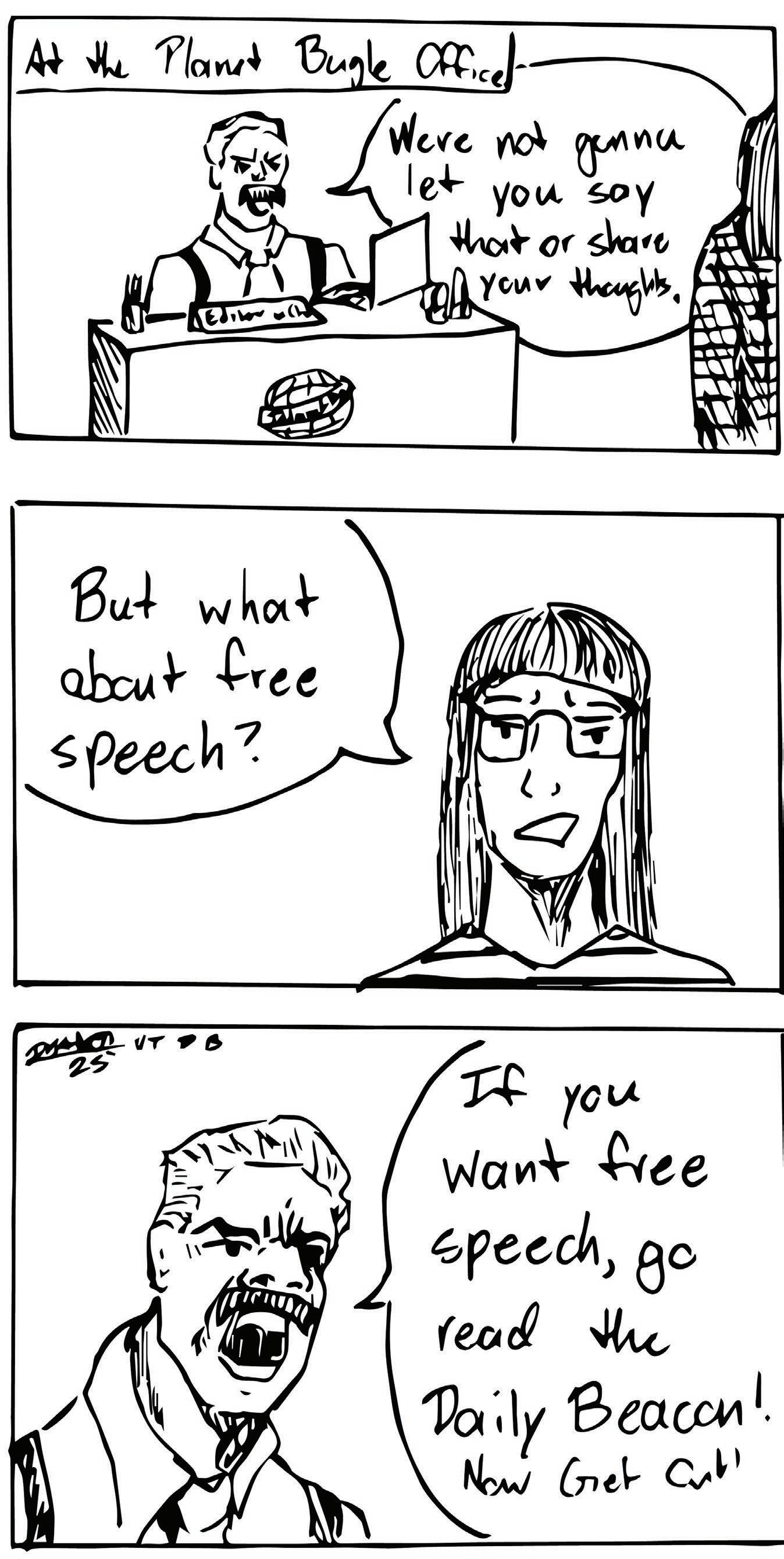

PATRICK BUSCH News Editor

The United States has the strongest legal protections of speech for its citizens in the world, but my experience in the newsroom would serve as a juxtaposition to that fact. Since I joined The Daily Beacon in the fall of 2024 and began covering political topics, I’ve seen people’s fear of commenting firsthand. Across the political spectrum, they are scared of potential backlash to their comments: losing their friends, their jobs or their reputation.
I’ve seen professors and staff alike cite uneasiness when approached for comment. I’ve personally had several sources recoil at the idea of going on the record. Recently, I have had to direct writers to include lines reporting that a majority of those approached for an
interview refused.
When there is a chilling effect on speech, when people overwhelmingly decline our interviews, it affects our reporting. It becomes more difficult for us to serve our community and to provide well-rounded coverage on issues.
I’ve observed and can describe the dichotomy between the silence exercised by students and faculty. When students choose not to comment, it’s often because they fear jeopardizing their careers, damaging friendships, or being doxxed, attacked or called out online. When declining interviews, faculty and staff have cited an uneasy or unfriendly atmosphere originating from their administrators.
In the wake of the termination proceedings against Tamar Shirinian, faculty have clamped down further. Faculty have spoken to me and my writers, on and off the record, to describe a climate of fear at UT and a preference against speaking their minds publicly.
The University of Tennessee has
STORY CONTINUED FROM PAGE 7
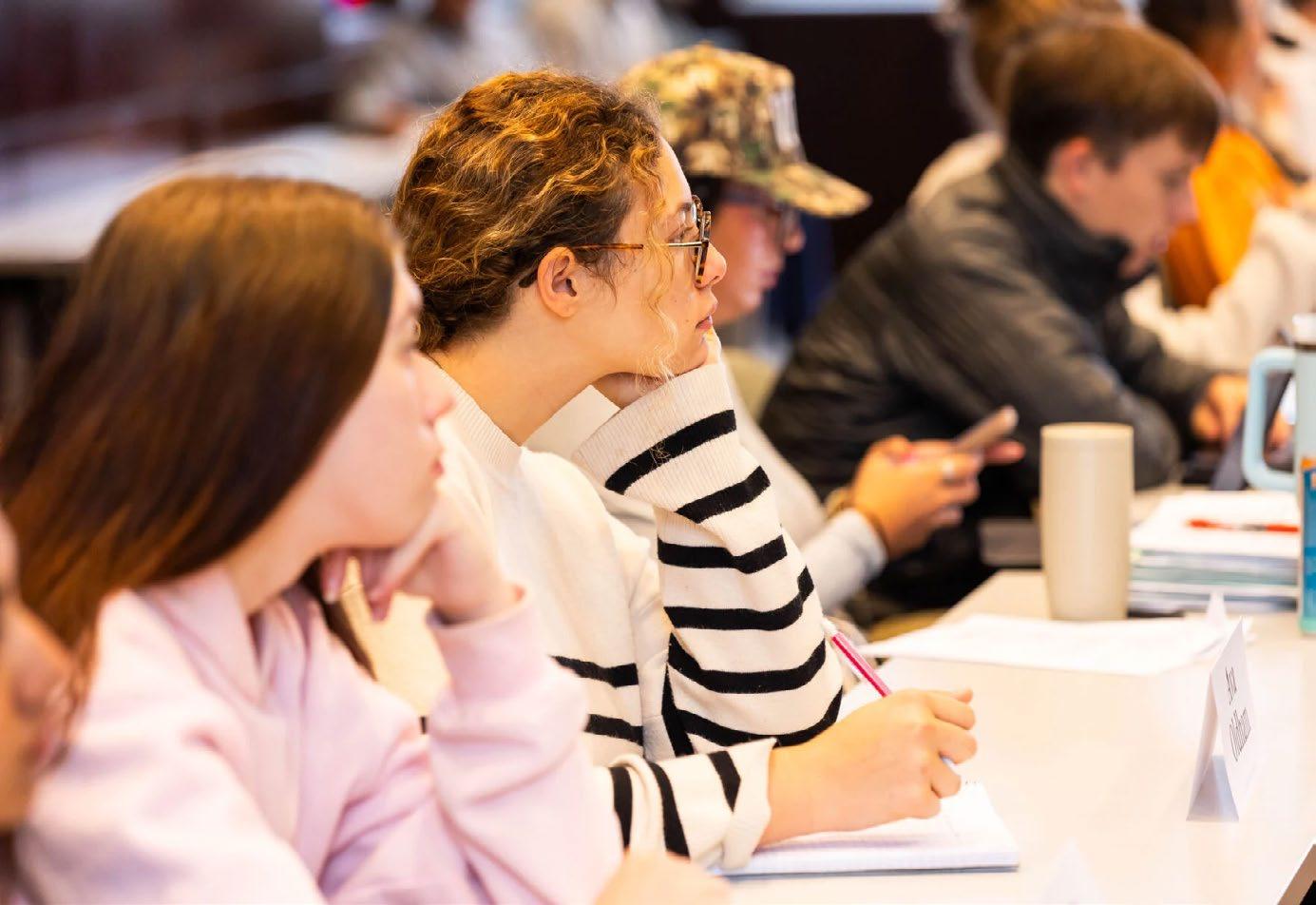
Students in IAC 101 in the Howard Baker School. Tuesday, Oct. 28, 2025.
Jayden Randolph / The Daily Beacon
The institute serves to fight this trend by educating the UT community about civics through academic programs, courses and special events.
“Those courses are designed to convey great civic knowledge, and also to promote discussion, and even debate sometimes, about key issues in America’s civic life, both past and current,” Andrew Busch, associate
an extensive public relations network that funnels almost all communication through a few individuals. The result is that a significant number of our requests for information are redirected, and so many of the responses we do receive are brief, evasive or unhelpful.
University officials routinely decline our offers for conversation or sit-down interviews, instead choosing to email us brief, preapproved statements which lack meaningful answers. This erodes the authenticity of our interactions with members of the university. It limits how clearly we can understand the university’s perspective. It’s disturbing when, as a public, land-grant university, we cannot get the answers to questions students are asking.
From what I’ve seen, there is a great “falling in line” effect taking place on our campus. The university has worked in many instances to assure it is in step with state and federal politicians and laws on potentially contentious matters. Students have watched others face retaliation online and as a result, many
et cetera. Students are quite hungry for that,” Scheb said, “But what we’re thinking is, we shouldn’t just wait till people are college freshmen.”
The institute recently won a $2 million grant from the US Department of Education, furthering these K-12 efforts. Additionally, the state legislature increased the institute’s annual $4 million fund to $5.4 million dollars, with the new funds being dedicated to the K-12 program.
“They are both aiming at the same thing, that is helping us to work with K-12 educators to make civics education as good as it can be in the state of Tennessee,” Busch said.
These increases in funding come at a time where many higher education institutions are seeing cuts in government funding. On the other hand, the Institute of American Civics, Lyons said, is receiving an increase in funding due to its importance in the modern political climate.
seem genuinely afraid to have their names attached to any form of political statement.
I’ll reiterate that our nation has strong, constitutional protections for everyone’s right to free speech, but how important is that fact if people are afraid to exercise their speech? Right now there are serious disincentives to doing so, and as long as that is the reality, our community will suffer. It is never a good thing when people are afraid to talk.
To those who have spoken to me and my team on sensitive topics, I personally thank you. You are in the minority. It is with dismay that I say it takes a level of courage in this moment to exercise the American ideal of free expression.
Free expression goes beyond enabling quality journalism that serves its community. It is the bedrock of this nation, and a privilege most people around the world don’t have. Use it.

that you used to assume people knew,” Lyons said. “We need to concentrate more effort in making that happen.”
Social media has really allowed people to, kind of, retreat into their echo chambers and never really engage with people who think differently, and we’re trying to get people to be willing to do that.”
- JOHN SCHEB Baker School interim associate dean of academic affairs
director of the institute, said.
The other facet of the institute is its service to K-12 education. The institute invites K-12 students and teachers to UT, or travels to visit them, in order to teach them about civics.
“There’s a great need for people to be educated on the founding, and sort of the principles of American government and constitutionalism, people’s rights,
“There’s been a recognition that what the institute does is something that people need more of colleges to do,” Lyons said.
What people need to know, and what the institute is teaching, Lyons said, goes back to basic government knowledge.
“People don’t understand the founding, or what it is, they don’t understand what representative democracy is, they don’t understand checks and balances, all this basic stuff,
One of the institute’s other pillars is fostering viewpoint diversity — understanding and respecting that everyone has their own ideas and opinions because of their different experiences — on campus. Being able to speak your own opinion while also respecting others is crucial, the professors said, especially in a time where so many are questioning free speech.
“I think we need to have as much viewpoint diversity and respect for other viewpoints,” Lyons said, “That depends upon a degree of respect, if not agreement, with the fact that people don’t necessarily think alike.”
NATALIE DRIPCHAK Opinions Editor
When someone brings up the United States, what is the first thing you think of? I think of freedom and being able to say and be whatever you believe in. Still, many people might not be on the same page after recent events regarding personal liberty and freedom of speech.
If you have been following news of any kind, you might be aware of what has happened recently with Indiana University’s student-led newspaper, Indiana Daily Student.
On Oct. 14, Jim Rodenbush, advisor for the Indiana Daily Student, was fired for refusing to censor news stories regarding the school’s homecoming. The university also eliminated the newspaper’s print editions for the foreseeable future.
Following this, Indiana Daily Student released a letter from the editors which you can read on page 9.
Speaking of freedom of speech and freedom of the press, let’s take a look back at how social issues were presented on social media over the past few years.
In May 2020, police brutality led to the killing of George Floyd, sparking a nationwide wave of Black Lives Matter protests that demanded justice and systemic change across the country.
If you remember, during the height of the COVID-19 pandemic, people turned to social media, specifically Instagram, to voice their concerns.
Many people participated in “Blackout Tuesday,” which consisted of posting a black screen to their Instagram feeds with #BlackLivesMatter. However, there were some critiques about whether this was actually beneficial for spreading information.
According to a CNN article, rapper Lil Nas X commented that “I just really think this is the time to push as hard as ever, I don’t think the movement has ever been this powerful. We don’t need to slow it down by posting nothing. We need to spread info as loud as ever.”
Criticism came from many people with different perspectives, but the main thing that was argued was that posting a black screen on Instagram does not do anything beneficial for the issues being addressed.
In the same CNN article, music artist Kehlani pointed out, “When you check the #BlackLivesMatter hashtag, it’s no longer videos, helpful information, resources, documentation of the
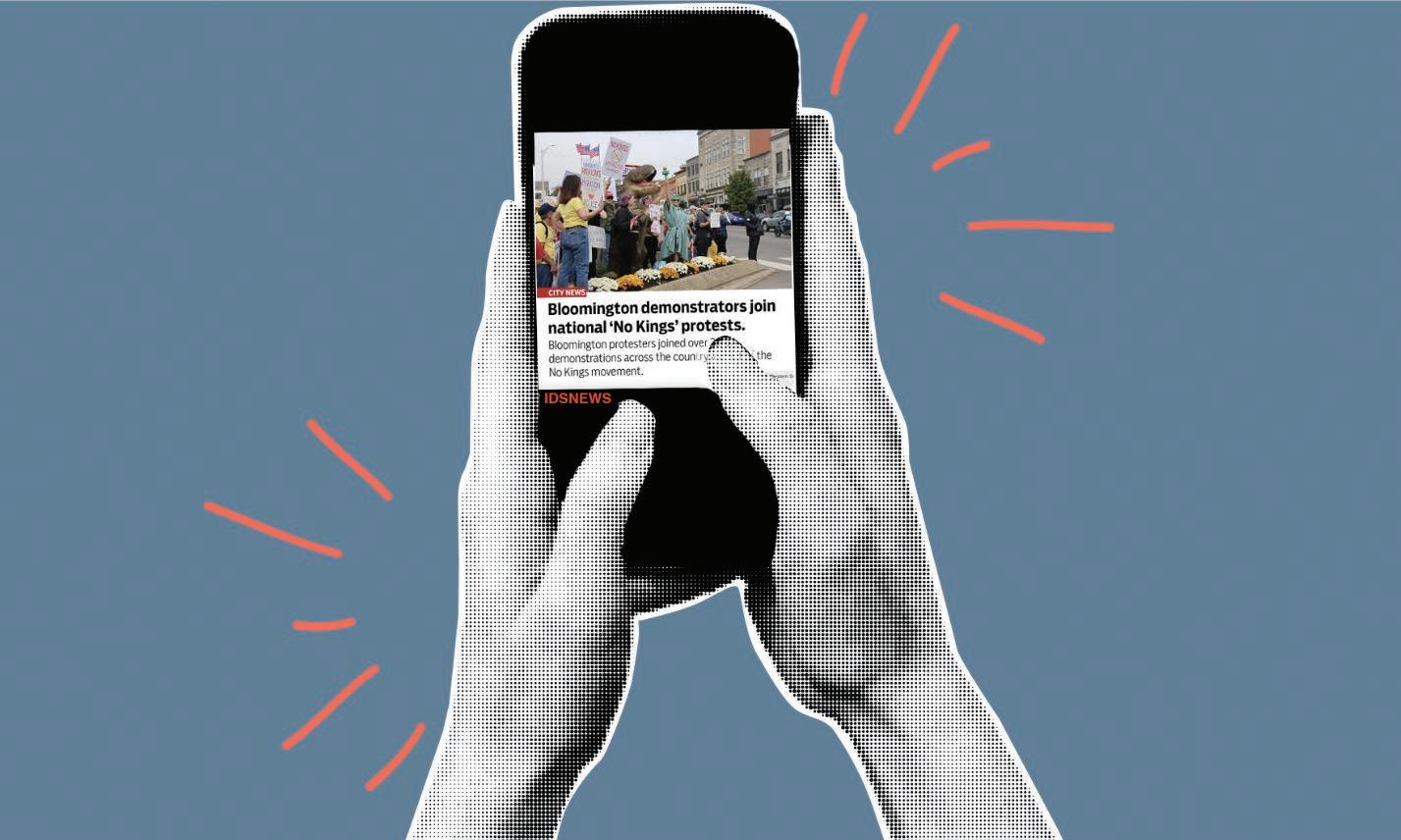
Graphic by Ashley Cammarota
injustice, it’s rows of black screens.”
Posting vital information and resources regarding current events is important, but it needs to be done in a way that will be effective.
Now, let’s go back to why we are talking about Instagram stories and posts. Freedom of speech and freedom of the press are rights that each and every U.S. citizen is entitled to. Of course, if you want to go ahead and post as an activist, you have a right to, but the real question is, does it actually do what it was intended to do?
In my opinion, it’s not a clear yes-orno — I think there are pros and cons to both. Posting on social media doesn’t mean anything, in my opinion. Social media is always curated to paint this perfect picture of someone’s life, beliefs, and interests, so what is the difference when it comes to reposting political posts?
But sharing and circulating information is essential for people to become aware and educated about social and political issues, not just in the United States but around the world. Posting critical information can be a very good thing for many different reasons, but there are some troubles with this.
Many people feel pressured by their friends, family and even the media
to think a certain way about issues. Sometimes there is an idea that if you don’t post about something, especially hot-button topics, you must be an awful person or that you are not concerned with major issues in America — but that is not necessarily always the truth.
Each person in their own way is different, and personally, I was raised with the idea that everything does not need to be shared on social media. I tend to be more reserved with my social media, sharing highlights with my friends and family and keeping it light and fun.
But that does not mean I don’t read the news or that I am unaware of what is going on around the country and the world. There are some topics and issues I feel very passionate about, but I personally don’t believe I need to share them on social media for the world to see.
The recent events with Indiana University’s student newspaper are troubling to see. American citizens are entitled to freedom of speech and freedom of the press, and it is disheartening to see those rights being taken away or upended.
As the opinions editor of a student newspaper, I am grateful that other writers and I have a platform to share
our opinions without censorship. Instagram reposts can mean a lot, but they also don’t at the same time. We live in a world where every little thing is posted to social media, and it is not a bad thing if you don’t want to participate.
Besides, there are many more effective ways to educate yourself about current events. Try reading the news regularly or pick up a book — the opportunities to learn are endless. And if you genuinely care about change, put in the effort. Vote, volunteer, support local organizations in your community and use your voice to stand up for what you believe in.
The change starts with you.
Columns and letters of The Daily Beacon are the views of the individual and do not necessarily reflect the views of the Beacon or the Beacon’s editorial staff.


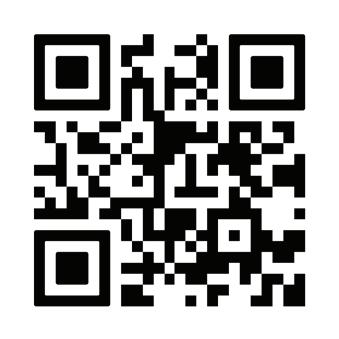
ALEX SARKIS Assistant Sports Editor
When the Vols exited the floor of Lucas Oil Stadium last March, Rick Barnes knew the next time he paced the sideline, things would look much different.
Seven months later, that time is here. Tennessee trotted nine newcomers out of the tunnel for an exhibition matchup with Duke, a preseason test for both squads meant to sharpen iron with iron. The Blue Devils came out on top with an 83-76 victory, one that the Vols’ 11thyear headman saw much to improve upon.
For Barnes, physicality is always sits at top of his list.
“We were not as physical as we were a year ago,” Barnes said. “We got to get there. We’re not there yet.”
There’s no true stat that can fully exemplify physicality in basketball. The term is a broad one, usually best
evaluated by a simple eye test. Rebounds are a category where toughness is often stressed, an area of Tennessee’s game that it continues to stress after boards became one of the thorns in the Vols’ side a season ago.
The Blue Devils outrebounded Tennessee 48-39 in Sunday’s contest, finding 16 different instances of success on the offensive glass.
Barnes is aware that his new-look contingent requires plenty of work, but it’s a realization he wanted to have when scheduling a battle with one of the sport’s perennial powerhouses.
The learning experience is sometimes the most important part.
“I love these games,” Barnes said. “I think it’s really important we can get a chance to do this, but we’ve got a lot to learn from it, and we’ll see what we can do”
Nate Ament and Ja’Kobi Gillespie may have learned the most out of anyone on the evening. Duke’s defensive approach to contain a pair of the Vols’ best offensive weapons put both under
adversity, a struggle sparked by a new level of competition. The tale of two players features Ament’s ongoing transition to the college level, while Gillespie’s hurdle comes in the movement to one of the nation’s
“It’s good for them, because people are going to go after them like that. I think our guys have worked really hard being physical with Nate this summer, which I think is going to continue to help him. We’ve got to understand the whole different level we’ve got to get to. We know right now we’re nowhere near where we need to be defensively.”
RICK BARNES Head coach
premier conferences. The pending campaign will feature different sets of growing pains for each.
“It is good for them,” Barnes said.
The trademark of any Barnes-coached
team needs to be on par with his expectations if Tennessee expects to get anywhere when more important games roll around. Duke exposed the Vols’ defense on several occasions, capitalizing on a series of wide-open looks early in the game. When Tennessee’s scoring ability falters like it did in the second half, things get dangerous if breakdowns start to occur. A 46-33 margin separated the two teams on the scoreboard during the closing frame when the shots didn’t fall.
“They had some easy layups going down the lane,” Barnes said. “We had guys who were just afraid to leave their man and step over, make him make another pass. We just did some things we can’t do. All of it, all of that can be fixed.”
KEIRA EVERETT
Tennessee swimming & diving enjoyed a quality road showing to kick off its season with plenty of promising performances.
The Lady Vols came in ranked No. 4 in the preseason poll, and the Vols at No. 5, setting up a high-energy matchup in Austin. The women suffered a 13551 defeat to the Longhorns, while the men fell 120-65. Texas even promoted the meet through Meta advertisements, adding to the anticipation.
One of Tennessee’s top performers, Camille Spink, got things rolling with a 21.43 to win the 50-meter freestyle. She followed that up with a 47.07 in the 100 freestyle, finishing second while staying close to her 46.25 best time from last year’s SEC Championships.
McKenzie Siroky, an NCAA finalist and world championships qualifier, kept the momentum going in the breaststroke. Her 57.78 came in just shy of her lifetime best from last season’s SEC Championships. Sophomore Ella Jansen also had a big day, landing on the podium in the 200 IM, 200 freestyle and
400 IM. She posted a 1:43.48 from the free that ranks in the Lady Vols’ all-time top ten.
The men came out strong as well. Gui Caribe, Pedro Sansone, Nikoli Blackman and Kamal Muhammad teamed up to win the 200 freestyle relay. Caribe turned in some fast swims in the 50 and 100 free. Senior Martin Espernberger grabbed a win of his own in the 200 fly with a 1:41.86.
Freshman Gabe Nunziata made an impressive debut, finishing the 200 breaststroke in 1:53.62. This mark beat his lifetime best of 1:53.73 and secured a spot in the Tennessee record books.
In diving, freshman Desharne BentAshmeil stood out with a 291.30, good enough for a second-place finish in the two-meter, followed by a 316.35 on the three-meter. Lynae Shorter, one of Tennessee’s top returning divers, also started strong with a 325.48 on the three-meter board. Both helped lead a solid showing from the Lady Vols divers.
While Texas took the meet, Tennessee came away with plenty of positives. Strong early-season swims, personal bests and big contributions from both veterans and newcomers highlighted the day.
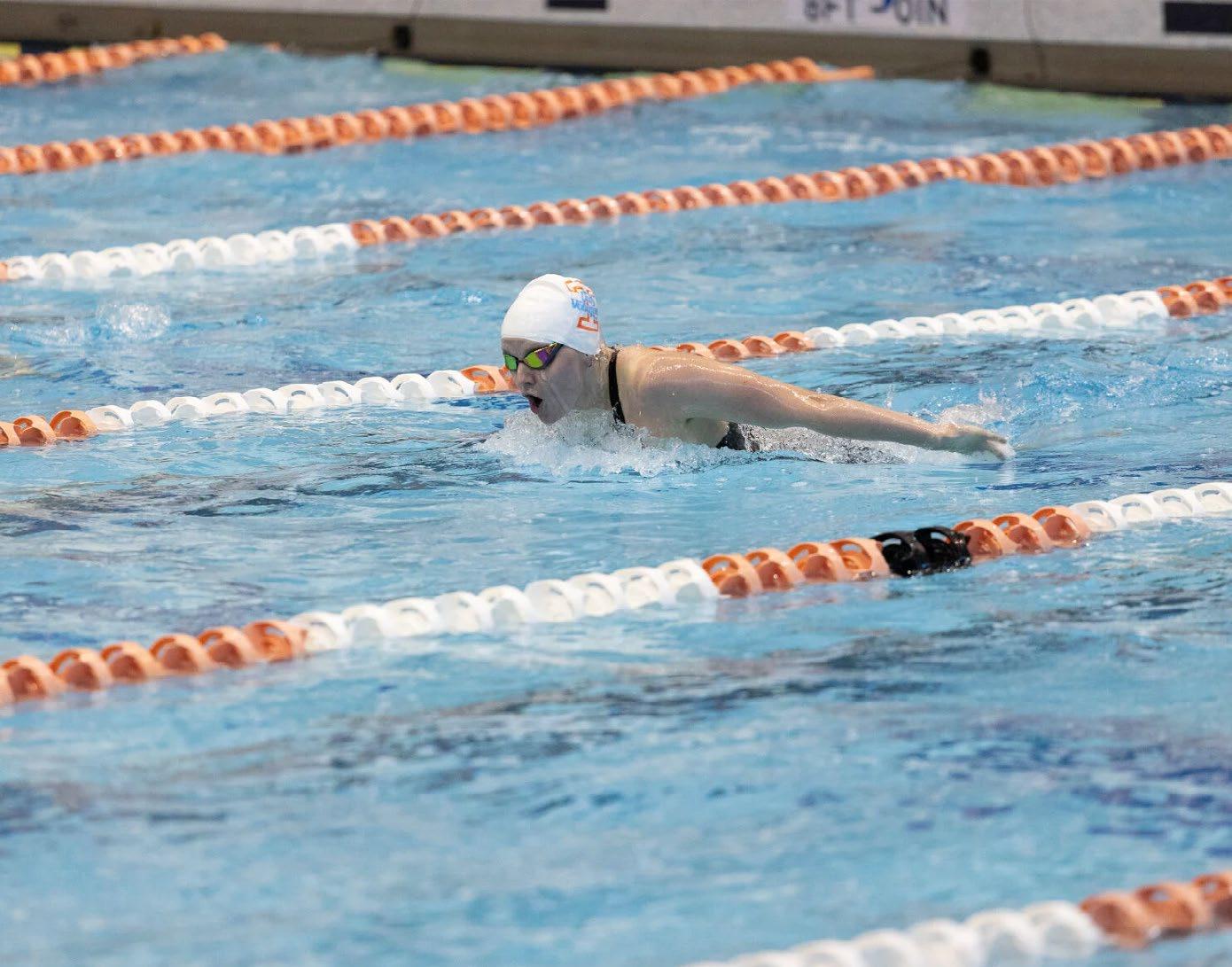
Contributor Ella Jansen races in a heat of the women’s 200 meter butterfly at the Tennessee invitational at the Allan Jones Intercollegiate Aquatic Center. Friday, Nov. 22, 2024. Ericksen Gomez-Villeda / The Daily Beacon
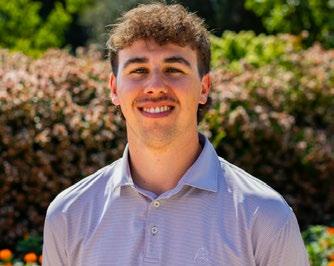


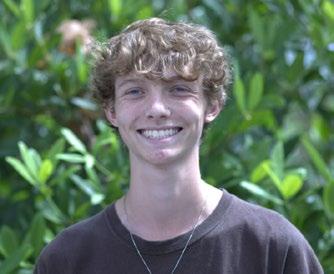
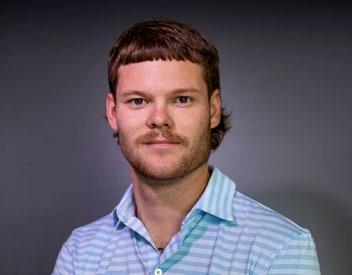

Oklahoma 17 vs. Tennessee 24 Vanderbilt vs. Texas Georgia vs. Florida
Miami vs. SMU